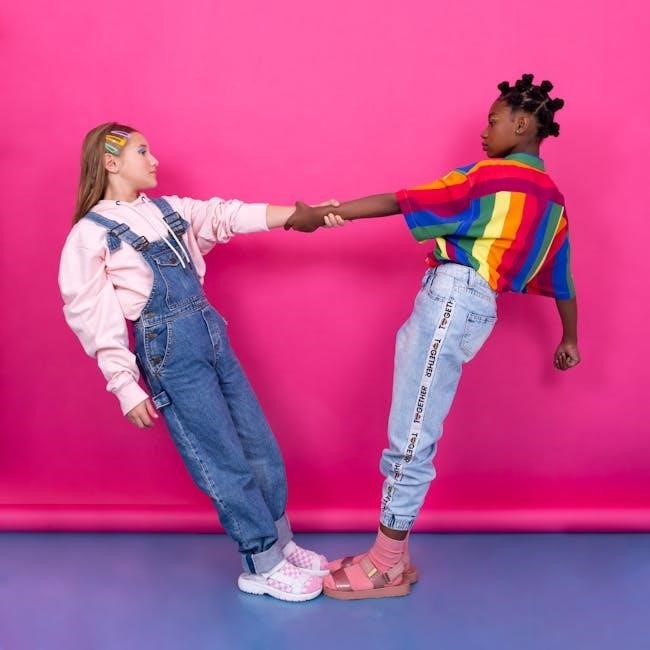The 2023 Diversity Calendar is a comprehensive guide promoting inclusivity, cultural awareness, and equity. It highlights religious festivals, EDI events, and multicultural celebrations throughout the year.

Religious Festivals and Celebrations in 2023
The 2023 Diversity Calendar features a wide range of religious festivals, showcasing diverse cultural and spiritual traditions that foster unity and respect across communities globally.
2.1. Key Religious Dates in 2023
The 2023 Diversity Calendar highlights significant religious dates, fostering cultural understanding and respect. Key dates include Labour Day, Yom Kippur, and Orange Shirt Day, which honor diverse traditions and histories globally.
2.2. Cultural Significance of These Festivals
These festivals hold profound cultural and spiritual significance, reflecting the diverse traditions of global communities. They serve as opportunities for reflection, celebration, and unity, fostering mutual respect and inclusivity.

Equality, Diversity, and Inclusion (EDI) Events in 2023
EDI events in 2023 include Labour Day, Orange Shirt Day, and National Day for Truth and Reconciliation, promoting awareness and fostering inclusive communities across diverse cultures.
3.1. Labour Day and Its Importance
Labor Day, observed on the first Monday in September, honors the achievements of workers and their contributions to society. It emphasizes fair labor practices, workers’ rights, and social justice, reflecting the principles of equality and diversity. This day is crucial for promoting inclusivity and recognizing the efforts of all individuals, regardless of background, in building stronger communities. By celebrating Labor Day, we acknowledge the importance of equitable treatment and opportunities for all workers, fostering a culture of respect and collaboration.
3.2. Orange Shirt Day and National Day for Truth and Reconciliation
Orange Shirt Day, observed on September 30, raises awareness of the impacts of residential schools on Indigenous communities. It honors survivors and remembers those who did not return home. The National Day for Truth and Reconciliation, also in September, is a federal holiday to reflect on the truths of Indigenous experiences and promote reconciliation. Together, these days encourage education, reflection, and action toward healing and equity. Wearing orange shirts symbolizes remembrance and hope for a more inclusive future. These observances are vital for fostering understanding and advancing diversity and inclusion in Canada.
Multicultural Celebrations and Awareness Months

Multicultural celebrations honor diverse traditions and promote cultural awareness. Key awareness months include LGBT History Month, Black History Month, and International Women’s Day, fostering inclusivity.
4.1. LGBT History Month and Its Contributions
LGBT History Month, celebrated in February, honors the achievements and contributions of the LGBT community. It raises awareness about historical struggles and progress, promoting inclusivity and equality. This month educates communities about LGBT rights, fostering understanding and acceptance. By highlighting key figures and events, it inspires future generations to continue advancing diversity and inclusion. The celebration strengthens solidarity and promotes cultural change, ensuring that LGBT voices are heard and valued in society.
4.2. UK National Heart Month and Its Impact
UK National Heart Month, observed in February, aims to raise awareness about heart health and reduce cardiovascular disease risks. It emphasizes the importance of healthy lifestyles, early diagnosis, and community support. By promoting educational campaigns and events, it encourages individuals to prioritize heart health. The initiative fosters inclusivity by addressing disparities in healthcare access. Its impact extends beyond awareness, inspiring policy changes and community engagement. This month plays a vital role in the Diversity Calendar 2023 by highlighting health equity and encouraging collective action for a healthier society.

Key Dates and Events in the Diversity Calendar 2023
This section highlights significant cultural, religious, and EDI events, fostering inclusivity and awareness through key dates like Labour Day, Yom Kippur, and World Down Syndrome Day.
5.1. January: New Year and Multicultural Traditions
January marks the beginning of the year, celebrating renewal and diverse cultural traditions worldwide. Many communities observe New Year with fireworks, family gatherings, and reflective practices. In some cultures, it’s a time for setting intentions or honoring ancestors. Additionally, various religious and cultural events occur, showcasing the richness of global diversity. These traditions highlight the importance of inclusivity and mutual respect, fostering a sense of unity amidst differences. By acknowledging these practices, the diversity calendar promotes cross-cultural understanding and appreciation for the vibrant tapestry of human experiences.
5.2. February: LGBT History Month and Raynauds Awareness Month
February is a month of dual significance, celebrating both LGBT History Month and Raynauds Awareness Month. LGBT History Month honors the contributions and achievements of the LGBT community, fostering inclusivity and equality. It serves as a platform to educate about the history of LGBT rights and promote acceptance. Simultaneously, Raynauds Awareness Month highlights a health condition affecting blood flow, raising awareness and support for those impacted. Together, these observances underscore the importance of diversity, health awareness, and collective efforts to create an inclusive society. By recognizing these events, the diversity calendar encourages empathy, education, and advocacy throughout the month.
5.3. March: World Down Syndrome Day and International Women’s Day
March is a significant month in the diversity calendar, highlighting two key events: World Down Syndrome Day and International Women’s Day. World Down Syndrome Day, observed on March 21, aims to raise awareness and promote inclusion for individuals with Down syndrome, celebrating their contributions to society. International Women’s Day on March 8 honors women’s achievements and advocates for gender equality globally. Both events emphasize the importance of diversity, equity, and inclusion, encouraging communities to recognize and support underrepresented groups. These celebrations foster a culture of acceptance and empowerment, aligning with the broader goals of the diversity calendar.
5.4. September: Labour Day and Yom Kippur
September is a month of significant events in the diversity calendar, featuring Labour Day and Yom Kippur. Labour Day, celebrated on the first Monday in September, honors the achievements of workers and the labor movement, advocating for fair wages and safe working conditions. It is a federal holiday in Canada, providing a long weekend for many. Yom Kippur, occurring in September or October, is a Jewish holiday of atonement and reflection, marked by fasting and synagogue services. Both events highlight the importance of social justice, equality, and religious observance, reflecting the diversity calendar’s commitment to inclusivity and respect for all traditions.
The Benefits of a Diversity Calendar
The Diversity Calendar 2023 fosters inclusivity, celebrates cultural diversity, and promotes social harmony by educating communities about various traditions and events.
6.1. Promoting Inclusivity in Communities
The 2023 Diversity Calendar plays a vital role in fostering inclusivity by recognizing diverse traditions, holidays, and events. It encourages communities to embrace cultural differences, creating a harmonious environment where everyone feels valued. By highlighting key dates such as Labour Day, Orange Shirt Day, and LGBT History Month, the calendar raises awareness about social justice and equality. This collective recognition helps break down barriers and promotes mutual respect among individuals from all backgrounds. Ultimately, it serves as a tool to strengthen community bonds and celebrate the richness of diversity.
6.2. Educational Value and Awareness
The 2023 Diversity Calendar serves as an educational tool, raising awareness about diverse cultures, religions, and social causes. It educates individuals about significant dates like LGBT History Month, World Down Syndrome Day, and National Heart Month. By highlighting these events, the calendar fosters understanding and appreciation for different communities. Schools, workplaces, and organizations can use it to promote inclusive dialogue and learning. It also encourages reflection on historical and contemporary issues, such as the importance of Labour Day and the significance of Orange Shirt Day. This educational resource helps break down stereotypes and fosters a culture of acceptance and mutual respect.

Sources and References for the Diversity Calendar 2023
- Equity, Diversity, and Inclusion Guide for Grassroots Football
- Multicultural Calendar by National PTA
- Academic resources from UCL and Inova
These resources provide comprehensive insights and frameworks for creating inclusive calendars.

7.1. Equity, Diversity, and Inclusion Guide for Grassroots Football
The Equity, Diversity, and Inclusion (EDI) Guide for Grassroots Football serves as a vital resource for promoting diversity in sports. It provides frameworks for fostering inclusivity, ensuring equal opportunities, and celebrating diverse backgrounds within football communities. The guide emphasizes the importance of cultural sensitivity and addresses key events like Labour Day and Orange Shirt Day, highlighting their relevance to broader societal inclusion. By aligning with values of respect and fairness, this guide supports the creation of welcoming environments for all participants. Its insights are invaluable for organizations aiming to embed EDI principles into their practices and events.
7.2. Multicultural Calendar by National PTA
The National PTA’s Multicultural Calendar is a valuable resource for promoting diversity and cultural awareness. It showcases a wide range of holidays, traditions, and celebrations from diverse cultures, helping communities recognize and appreciate different heritage. This calendar is particularly useful for schools and families, offering insights into various cultural practices and fostering inclusivity. By highlighting these observances, it encourages dialogue and understanding, making it a key tool for creating an inclusive environment. Its comprehensive approach ensures that diverse traditions are celebrated and respected, aligning with broader goals of equity and cultural sensitivity.
7.3. Academic and Institutional Resources
Academic and institutional resources play a crucial role in shaping the 2023 Diversity Calendar. Universities and educational institutions provide detailed guides, case studies, and best practices for promoting diversity and inclusion. For instance, resources from www.ucl.ac.uk and inclusiveschools.sd33.bc.ca offer comprehensive insights into creating inclusive environments. These materials are often tailored for educational settings, helping to foster understanding and respect for diverse backgrounds. By incorporating cultural practices and historical events, these resources enhance the educational value of diversity calendars. They also align with institutional goals of equity, diversity, and inclusion, making them indispensable tools for promoting a culture of respect and awareness.
